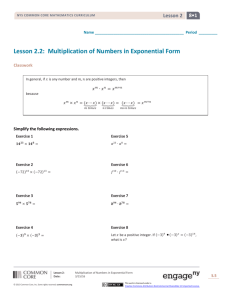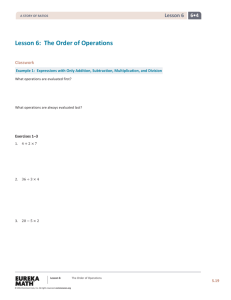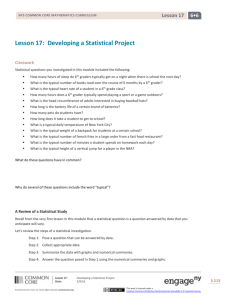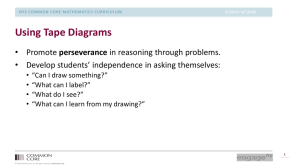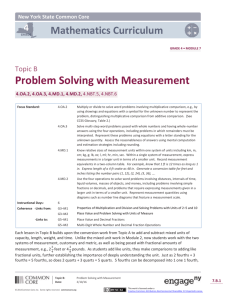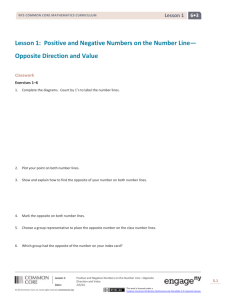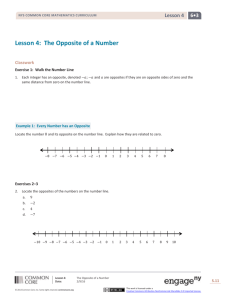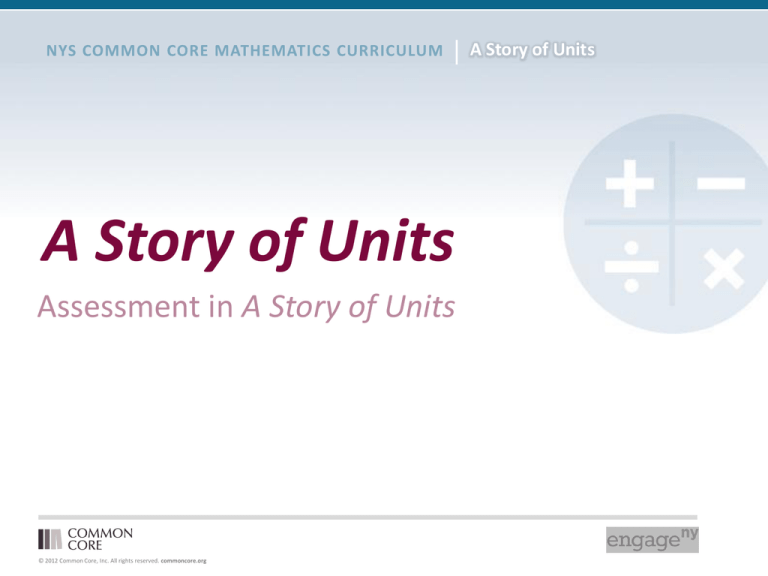
A Story of Units
A Story of Units
Assessment in A Story of Units
© 2012 Common Core, Inc. All rights reserved. commoncore.org
A Story of Units
Unit Form
230 can be written in unit form in different ways:
2 hundreds 3 tens
23 tens
230 ones
2300 tenths etc.
2
© 2012 Common Core, Inc. All rights reserved. commoncore.org
A Story of Units
Do Now! Exit Ticket
Please complete an Exit Ticket on your tables for two
minutes.
3
© 2012 Common Core, Inc. All rights reserved. commoncore.org
A Story of Units
Exit Ticket Debrief
• Share your ticket with your triad for 3 minutes, 1
minute for each lesson’s ticket. Start with Lesson 3,
then Lesson 4, then Lesson 5.
• Review the challenges that each presented.
• Consider the instructional decisions the teacher
might make from the results.
4
© 2012 Common Core, Inc. All rights reserved. commoncore.org
A Story of Units
Session Objectives
• Examine and practice the use of informal assessment during
the lesson components: Fluency, the Application Problem,
Concept Development, and the Debrief.
• Examine and practice use of formal assessments including
Mid-Module and End-of-Module Assessment Tasks.
• Relate both informal and formal assessments to the cycle of
“Assess Analyze Plan Teach.”
5
© 2012 Common Core, Inc. All rights reserved. commoncore.org
A Story of Units
Agenda
• Review the Cycle of Assess, Analyze, Plan, Teach
• Study Informal Assessment within the Lesson
Components
• Study Formal Assessments: Mid- and End-of
Module Tasks
6
© 2012 Common Core, Inc. All rights reserved. commoncore.org
A Story of Units
Informal Assessment in A Story of Units
Assess
Teach
Analyze
Plan
7
© 2012 Common Core, Inc. All rights reserved. commoncore.org
A Story of Units
Informal Assessment within Lesson
Components
8
© 2012 Common Core, Inc. All rights reserved. commoncore.org
A Story of Units
Fluency Work
T:
S:
T:
S:
(Write 4 x 2 ones = __.) Write the multiplication sentence.
4 x 2 = 8.
Say the multiplication sentence in unit form.
4 x 2 ones = 8 ones.
Repeat the process for 4 x 0.2; 4 x 0.02; 5 x 3; 5 x 0.3; 5 x 0.03; 3 x
0.2; 3 x 0.03; 3 x 0.23; and 2 x 0.14.
9
© 2012 Common Core, Inc. All rights reserved. commoncore.org
A Story of Units
Application Problems
A bag of potato chips contains 0.96 grams of sodium.
If the bag is split into 8 equal servings, how many
grams of sodium will each serving contain?
10
© 2012 Common Core, Inc. All rights reserved. commoncore.org
A Story of Units
The Concept Development
Problem 4
5.1 x 6 = 30.6
T:
S:
T:
S:
T:
What is the smallest unit in 5.1?
Tenths.
How many tenths are the same as 5.1?
51 tenths.
Suppose our multiplication sentence was 51 x 6.
What is the product?
S: (Pause as students work.) 306.
T: Is 306 a reasonable product for our actual problem of 5.1 x 6? Turn and talk.
11
© 2012 Common Core, Inc. All rights reserved. commoncore.org
A Story of Units
The Debrief
How can whole number multiplication help you
with decimal multiplication?
12
© 2012 Common Core, Inc. All rights reserved. commoncore.org
A Story of Units
The Exit Ticket:
A Formal Tool for Informal Assessment
• The Exit Ticket closes each lesson from Grade 1 to Grade 5.
• The Exit Ticket is part of the Student Debrief, comprising 3
minutes of the approximately 10 minute component.
• Information is used to make subsequent instructional decisions.
13
© 2012 Common Core, Inc. All rights reserved. commoncore.org
A Story of Units
Units in Expanded Form
7 × 103 + 6 × 10 + 3 × 1 = 7063
2 + 9 × 1 = 2.9
10
29 × 1 = 2.9
10
14
© 2012 Common Core, Inc. All rights reserved. commoncore.org
A Story of Units
Unit Conversion
To convert yards to feet, multiply by 3.
To convert feet to yards, multiply by 1 (or divide by 3).
3
2 yards = 2 × (1 yard) = 2 × (3 feet) = 6 feet.
6 feet = 6 × (1 foot) = 6 × (1 yard) = 2 yards.
3
15
© 2012 Common Core, Inc. All rights reserved. commoncore.org
A Story of Units
Reflect
Thinking about informal assessment during the 4
major components of the lesson, share your takealways with a partner.
16
© 2012 Common Core, Inc. All rights reserved. commoncore.org
A Story of Units
Agenda
• Review the Cycle of Assess, Analyze, Plan, Teach
• Study Informal Assessment within the Lesson
Components
• Study Formal Assessments: Mid- and End-of
Module Tasks
17
© 2012 Common Core, Inc. All rights reserved. commoncore.org
A Story of Units
Formal Assessment in A Story of Units
Assess
Teach
Analyze
Plan
18
© 2012 Common Core, Inc. All rights reserved. commoncore.org
A Story of Units
Formal Assessment
• Mid-Module Assessment Task
• End-of-Module Assessment Task
19
© 2012 Common Core, Inc. All rights reserved. commoncore.org
A Story of Units
Assess
Complete the Grade 5
End-of-Module 1 Assessment.
20
© 2012 Common Core, Inc. All rights reserved. commoncore.org
A Story of Units
Analyze
Student work samples A – F using the rubric.
Give each a score.
21
© 2012 Common Core, Inc. All rights reserved. commoncore.org
A Story of Units
Plan
Write down at least one question you would ask each
student to either:
• Further assess in order to know how deeply to
scaffold.
• Advance their thinking.
Share your questions with your triad.
22
© 2012 Common Core, Inc. All rights reserved. commoncore.org
A Story of Units
Plan
What decisions would you make instructionally based on the
assessment for:
• Your day of review?
• Fluency components?
• Application Problems?
• Concept Development?
• Homework?
• Professional development opportunities?
23
© 2012 Common Core, Inc. All rights reserved. commoncore.org
A Story of Units
Teach
Implement the plan stemming from the analysis.
24
© 2012 Common Core, Inc. All rights reserved. commoncore.org
A Story of Units
Key Points
Assess
Teach
Analyze
Plan
25
© 2012 Common Core, Inc. All rights reserved. commoncore.org
A Story of Units
Next Steps
•
What obstacles do you anticipate
in effectively implementing the
informal assessments?
•
Thinking about the culture of your school(s),
what obstacles do you anticipate in
effectively implementing the formal
assessments?
•
How can you surmount those
obstacles?
26
© 2012 Common Core, Inc. All rights reserved. commoncore.org

